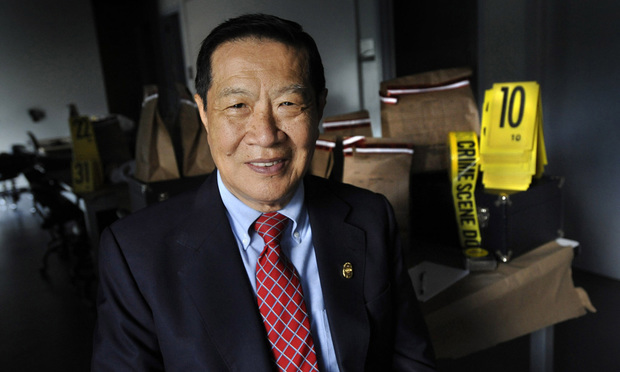Expert Witness Says He's a 'Casualty' After Conn. Supreme Court Vacates 2 Murder Convictions That Hinged on His Work
The Connecticut Supreme Court ruled that world-renowned forensic examiner Dr. Henry Lee made mistakes in how he handled a murder case decades ago. The court has ordered that two men, who spent decades in jail for murder, have their sentences vacated and that a new trial be called.
June 18, 2019 at 01:10 PM
4 minute read
 Dr. Henry Lee. Photo: Jessica Hill/AP
Dr. Henry Lee. Photo: Jessica Hill/AP
Taking aim at renowned Connecticut-based forensic scientist Dr. Henry Lee's expert testimony, the state Supreme Court vacated the murder convictions of two men who had spent decades in prison.
But Lee Tuesday defended his conclusions, saying he'd spent days examining the evidence before testifying.
In its 7-0 ruling Friday, Connecticut's high court was critical of Lee's testimony, specifically as it related to an alleged bloody towel found at the crime scene, calling his testimony at the trials of then-teenagers Ralph Birch and Shawn Henning, “incorrect.”
Birch was 18 and Henning was 17 in 1985 when 65-year-old Everett Carr was murdered in a New Milford home invasion. Authorities arrested Birch and Henning, who had stolen a vehicle nearby, for the murder. According to the recitation of facts in the state Supreme Court ruling, Carr was stabbed 27 times and was found lying in a pool of blood in his home.
The Supreme Court noted the teens hadn't had blood on them and the car they'd stolen had no signs of blood. But the jury, the Supreme Court said, had relied heavily on testimony from Lee related to the bloody towel.
Lee had told the jury he performed tests on two towels, and that “a smear of blood was” found on one of them in Carr's upstairs bathroom. The state's high court said that testimony was “incorrect” and surmised the jury could have relied on it.
The prosecutors at trial maintained that, based on Lee's testimony of the bloody towel, the two teenagers went to the bathroom to clean themselves up. Because the convicted men had no blood on them or blood in the car, the towel was seen as critical evidence. The state's high court wrote “the state's failure to correct Lee's testimony that there was blood on the bathroom towel deprived the petitioner of a fair trial.”
Writing for the court, Justice Richard Palmer said: “The state also adduced testimony from Lee … to explain how it was possible that the petitioner [Birch] and Henning could have stabbed the victims so many times without getting any blood on their clothing and without transferring any blood to the Buick. Lee explained that, although the victim fought with his assailants, all of the blood splatter in the hallway was uninterrupted, meaning that no individual or object was between the victim and the walls or floor to interrupt the blood splatter. According to Lee, this could explain why the assailants were not covered in the victim's blood.”
But Palmer continued: “If the jury had known that Lee's testimony about finding blood on the bathroom towel was incorrect, that knowledge might well have caused it to question the reliability of his other testimony.”
However, Lee, 82, told the Connecticut Law Tribune Tuesday, “Somehow, I've become the casualty for this legal problem. The towel was tested. It was a light smear of blood. I spent two days on the scene and did numerous tests.”
Lee added: “I don't want to say anything against Judge Palmer. He's a good friend and highly respected. I don't want rumors that I didn't test and made stuff up. I have 58 years of forensic police work and I did 800 cases, and this is the first time they said I did anything wrong.”
Whether to retry is in the hands of the state.
Birch, who was sentenced to 55 years in prison, is still incarcerated, pending the state's decision on a retrial. Henning, who was sentenced to 50 years, has been on parole since July 2018.
David Shepack, state's attorney for the Litchfield Judicial District, did not respond to a request for comment.
Representing Birch was Andrew O'Shea of Kirschbaum Law Group, who did not respond to a request for comment.
Representing Henning was Craig Raabe of Izard Kindall & Raabe, of West Hartford, and Jim Cousins of New Jersey-based organization Centurion, which represents people it believes were wrongly convicted.
In a statement, Raabe wrote his client was imprisoned “based on the false and misleading testimony of Henry Lee.”
He said, “It has taken 30 years to correct this injustice and we are very pleased with the court's thoughtful decision.”
This content has been archived. It is available through our partners, LexisNexis® and Bloomberg Law.
To view this content, please continue to their sites.
Not a Lexis Subscriber?
Subscribe Now
Not a Bloomberg Law Subscriber?
Subscribe Now
NOT FOR REPRINT
© 2025 ALM Global, LLC, All Rights Reserved. Request academic re-use from www.copyright.com. All other uses, submit a request to [email protected]. For more information visit Asset & Logo Licensing.
You Might Like
View All
Trump Administration Faces Legal Challenge Over EO Impacting Federal Workers
3 minute read
Settlement Allows Spouses of U.S. Citizens to Reopen Removal Proceedings
4 minute read
Trending Stories
- 1Starbucks Sues Ex-Executive to Recover $1M Signing Bonus
- 2Navigating AI Risks: Best Practices for Compliance and Security
- 320 New Judges? Connecticut Could Get Wave of Jurists
- 4Orrick Loses 10-Lawyer Team to Herbert Smith in Germany
- 5‘The US Market Is Critical’: KPMG’s Former Head of Global Legal Services On the Legal Arm of the Big Four Firm Entering the US
Who Got The Work
J. Brugh Lower of Gibbons has entered an appearance for industrial equipment supplier Devco Corporation in a pending trademark infringement lawsuit. The suit, accusing the defendant of selling knock-off Graco products, was filed Dec. 18 in New Jersey District Court by Rivkin Radler on behalf of Graco Inc. and Graco Minnesota. The case, assigned to U.S. District Judge Zahid N. Quraishi, is 3:24-cv-11294, Graco Inc. et al v. Devco Corporation.
Who Got The Work
Rebecca Maller-Stein and Kent A. Yalowitz of Arnold & Porter Kaye Scholer have entered their appearances for Hanaco Venture Capital and its executives, Lior Prosor and David Frankel, in a pending securities lawsuit. The action, filed on Dec. 24 in New York Southern District Court by Zell, Aron & Co. on behalf of Goldeneye Advisors, accuses the defendants of negligently and fraudulently managing the plaintiff's $1 million investment. The case, assigned to U.S. District Judge Vernon S. Broderick, is 1:24-cv-09918, Goldeneye Advisors, LLC v. Hanaco Venture Capital, Ltd. et al.
Who Got The Work
Attorneys from A&O Shearman has stepped in as defense counsel for Toronto-Dominion Bank and other defendants in a pending securities class action. The suit, filed Dec. 11 in New York Southern District Court by Bleichmar Fonti & Auld, accuses the defendants of concealing the bank's 'pervasive' deficiencies in regards to its compliance with the Bank Secrecy Act and the quality of its anti-money laundering controls. The case, assigned to U.S. District Judge Arun Subramanian, is 1:24-cv-09445, Gonzalez v. The Toronto-Dominion Bank et al.
Who Got The Work
Crown Castle International, a Pennsylvania company providing shared communications infrastructure, has turned to Luke D. Wolf of Gordon Rees Scully Mansukhani to fend off a pending breach-of-contract lawsuit. The court action, filed Nov. 25 in Michigan Eastern District Court by Hooper Hathaway PC on behalf of The Town Residences LLC, accuses Crown Castle of failing to transfer approximately $30,000 in utility payments from T-Mobile in breach of a roof-top lease and assignment agreement. The case, assigned to U.S. District Judge Susan K. Declercq, is 2:24-cv-13131, The Town Residences LLC v. T-Mobile US, Inc. et al.
Who Got The Work
Wilfred P. Coronato and Daniel M. Schwartz of McCarter & English have stepped in as defense counsel to Electrolux Home Products Inc. in a pending product liability lawsuit. The court action, filed Nov. 26 in New York Eastern District Court by Poulos Lopiccolo PC and Nagel Rice LLP on behalf of David Stern, alleges that the defendant's refrigerators’ drawers and shelving repeatedly break and fall apart within months after purchase. The case, assigned to U.S. District Judge Joan M. Azrack, is 2:24-cv-08204, Stern v. Electrolux Home Products, Inc.
Featured Firms
Law Offices of Gary Martin Hays & Associates, P.C.
(470) 294-1674
Law Offices of Mark E. Salomone
(857) 444-6468
Smith & Hassler
(713) 739-1250











